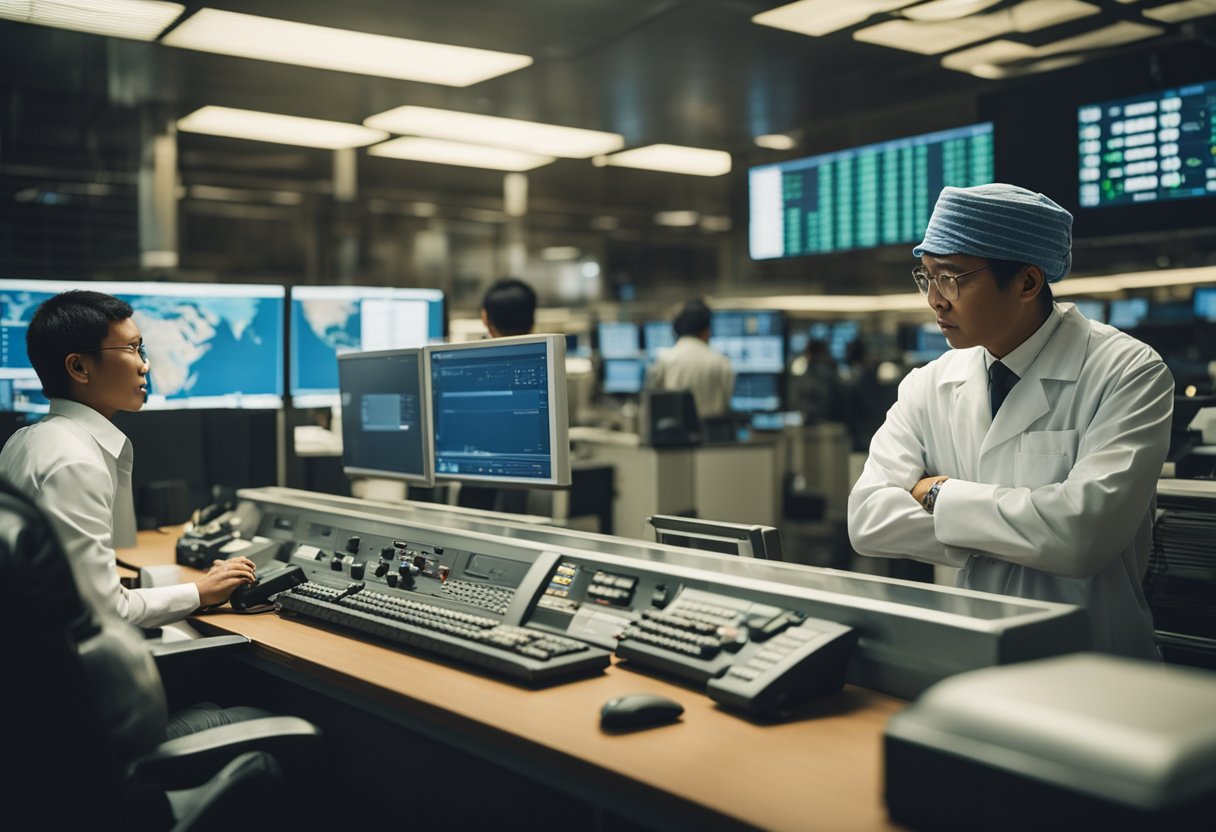Post-Trade Operations in Emerging Markets: An Overview
Get an overview of post-trade operations in emerging markets. Our expert insights explore the challenges and opportunities of this dynamic sector.

Post-trade operations are the processes that occur after a trade is executed, including clearing, settlement, and custody. These processes are critical for ensuring the smooth functioning of financial markets, as they help to reduce risk and increase transparency. Post-trade operations are essential in emerging markets, where the lack of infrastructure and regulatory frameworks can make it more difficult to execute trades and manage risk.

Understanding post-trade operations is critical to understanding the functioning of capital markets. In emerging markets, post-trade challenges can be particularly acute, as the lack of infrastructure and regulatory frameworks can create additional complexity. To manage these challenges, financial institutions must leverage the latest technology and best practices to optimize their post-trade processes and increase operational efficiency.
The role of technology in post-trade operations is becoming increasingly important as financial institutions seek to automate and streamline their processes. This can help reduce costs, increase speed, and improve accuracy while reducing the risk of errors and fraud. However, regulatory aspects of post-trade operations also need to be considered, as financial institutions need to comply with a range of rules and regulations governing risk management and the protection of investors.
Key Takeaways
- Post-trade operations are critical for ensuring the smooth functioning of financial markets, particularly in emerging markets where the lack of infrastructure and regulatory frameworks can create additional complexity.
- Financial institutions must leverage the latest technology and best practices to optimize their post-trade processes and increase operational efficiency.
- Regulatory aspects of post-trade operations also need to be considered, as financial institutions need to comply with a range of rules and regulations governing the management of risk and the protection of investors.
Understanding Post-Trade Operations
Post-trade operations refer to the processes after a trade is executed. These processes include clearing, settlement, and custody. The trade lifecycle consists of different stages, and post-trade operations are an essential part of this lifecycle. Post-trade operations ensure the trade is settled correctly and the assets are transferred to the appropriate parties.
Clearing is the process of matching the trades executed in the market. The clearing process involves verifying the trade details, including the price, quantity, and counterparty information. The clearing process also calculates each counterparty's net position and determines each party's obligations.
Settlement is transferring the assets between the parties involved in the trade. Settlement can be done either on a gross or net basis. In a gross settlement, each trade is settled individually, while in a net settlement, the trades are netted off against each other. Settlement failure occurs when one party fails to deliver the assets or the cash required to settle the trade.
In emerging markets, post-trade operations can be complex due to the lack of infrastructure and regulatory frameworks. The settlement process can be slow, with a higher risk of failure. The lack of transparency in the market can also make it difficult to track the progress of the settlement process.
Market participants can use technology solutions such as blockchain and artificial intelligence to mitigate the risks associated with post-trade operations in emerging markets. These solutions can help to automate the clearing and settlement processes, reduce the risk of settlement failure, and increase transparency in the market.
Related Posts:
Emerging Markets and Post-Trade Challenges

Post-trade operations in emerging markets present a unique set of challenges not present in developed markets. Emerging markets are characterized by high levels of risk, complexity, and regulatory challenges, which can result in errors and delays in post-trade operations.
One of the main challenges of post-trade operations in emerging markets is the high level of risk associated with these markets. Emerging markets are often subject to political and economic instability, resulting in sudden changes in market conditions and increased volatility. This can make it difficult for post-trade operations to keep up with changing market conditions, resulting in errors and delays.
Another challenge of post-trade operations in emerging markets is the complexity of these markets. Emerging markets are often characterized by a lack of transparency and information, making it difficult for post-trade operations to assess risk and execute trades accurately. This can result in errors and delays in post-trade operations, which can significantly impact investors.
Regulatory challenges are also a significant issue in post-trade operations in emerging markets. Emerging markets often have complex and fragmented regulatory frameworks that can be difficult to navigate. This can result in errors and delays in post-trade operations as firms struggle to comply with regulatory requirements in other markets.
In summary, post-trade operations in emerging markets present a unique set of challenges not present in developed markets. These challenges include high levels of risk, complexity, and regulatory challenges, which can result in errors and delays in post-trade operations. To overcome these challenges, firms need to deeply understand the markets they operate in and develop robust post-trade operations that can adapt to changing market conditions and regulatory requirements.
The Role of Technology in Post-Trade Operations

Technology plays a significant role in the post-trade operations of emerging markets. It enables market participants to manage the increasing complexity of the post-trade process and enhances operational efficiency. The use of technology has become critical in post-trade operations as it helps to reduce costs, improve transparency, and mitigate risks.
Technology innovation has led to developing of new solutions to re-architect post-trade operations. Legacy systems previously used in post-trade operations have become obsolete, and market participants are adopting new technologies such as distributed ledger technology (DLT), artificial intelligence (AI), cloud, and microservices.
DLT can potentially revolutionize post-trade operations by providing a secure and transparent way to track and settle transactions. It allows the creation of a shared and immutable ledger, which can be accessed by all parties involved. This technology can potentially significantly reduce the time and cost of post-trade operations.
AI is also being used to optimize post-trade operations. It can automate repetitive tasks, identify anomalies, and improve decision-making. AI algorithms can analyze large amounts of data to identify patterns and trends that would be difficult for humans to remember.
Cloud technology is also being used to improve the scalability and flexibility of post-trade operations. It allows market participants to access and use resources on demand, which can help reduce costs and improve operational efficiency.
Microservices architecture breaks down monolithic systems into smaller, more manageable components. This approach allows for greater flexibility and agility in post-trade operations. It also enables market participants to adopt new technologies more quickly.
JavaScript is becoming increasingly popular in post-trade operations due to its ease of use and versatility. It can be used to develop web-based applications accessed from anywhere and on any device. This technology can improve the user experience and make post-trade operations more accessible to a broader audience.
In conclusion, the role of technology in post-trade operations is critical in emerging markets. It enables market participants to manage the increasing complexity of the post-trade process and enhances operational efficiency. Adopting new technologies such as DLT, AI, cloud, microservices, and JavaScript is transforming the post-trade operations landscape and will continue to do so.
Post-Trade Operations and Financial Institutions
Post-trade operations are essential to the financial system, ensuring that trades are settled and assets are transferred between parties. Financial institutions, such as banks and investment firms, play a critical role in post-trade operations. They act as intermediaries between buyers and sellers, ensuring that trades are executed and settled promptly and efficiently.
Custodians are another vital entity in post-trade operations. They hold and safeguard assets on behalf of their clients, ensuring that they are correctly accounted for and transferred between parties. Custodians also provide various other services, such as asset servicing and reporting.
Brokers are intermediaries between buyers and sellers, executing trades on behalf of their clients. They play a critical role in post-trade operations, ensuring that trades are executed and settled promptly and efficiently. Brokers also provide various other services, such as research and analysis.
Buy-side firms, such as asset managers and pension funds, are essential players in post-trade operations. They buy and hold assets on behalf of their clients and are responsible for ensuring that trades are executed and settled in a timely and efficient manner. Buy-side firms also provide various other services, such as portfolio management and risk analysis.
Sell-side firms, such as investment banks and broker-dealers, are essential players in post-trade operations. They facilitate the buying and selling of securities and ensure that trades are executed and settled promptly and efficiently. Sell-side firms also provide various other services, such as research and analysis.
Overall, financial institutions play a critical role in post-trade operations, ensuring that trades are executed and settled promptly and efficiently. Custodians, brokers, buy-side firms, and sell-side firms all have essential roles to play in this process and work together to ensure that the financial system operates smoothly and efficiently.
Regulatory Aspects of Post-Trade Operations

Post-trade operations in emerging markets are subject to regulatory requirements that aim to ensure the integrity and stability of financial markets. These regulations are put in place by regulatory bodies to govern the activities of market participants, including brokers, exchanges, and clearinghouses, among others.
One of the primary objectives of post-trade regulations is to minimize counterparty risk and ensure that trades are settled promptly. Strict risk management practices, such as margin requirements and collateralization, achieve this. In addition, regulatory bodies require market participants to maintain sufficient capital buffers to absorb losses in the event of default.
Regulations governing post-trade operations also aim to promote transparency and fairness in financial markets. Market participants are required to report their trades to regulators promptly and accurately, which helps improve market surveillance and detect potential instances of market manipulation or insider trading.
Regulatory bodies also play a critical role in ensuring market participants comply with anti-money laundering (AML) and know-your-customer (KYC) regulations. This helps to prevent criminal activities, such as money laundering and terrorist financing, from taking place within financial markets.
In emerging markets, regulatory bodies may face challenges enforcing post-trade regulations due to limited resources and infrastructure. As a result, market participants may face more significant compliance costs and operational challenges when conducting post-trade activities. However, regulatory bodies are addressing these challenges by implementing new technologies and collaborating with international organizations to develop best practices for post-trade operations.
Overall, regulatory requirements for post-trade operations are critical for ensuring the stability and integrity of financial markets. Market participants must comply with these regulations to avoid legal and reputational risks.
Post-Trade Processes and Operational Efficiency

Post-trade processes are the steps that occur after a trade is executed, including clearing, settlement, and custody. These processes aim to ensure the timely and accurate transfer of securities and funds between the parties involved in the trade. In emerging markets, post-trade processes can be complex due to manual processes, lack of automation, and limited access to real-time data.
Operational efficiency is critical in post-trade processes to ensure that trades are settled accurately and efficiently. Manual processes can be time-consuming and error-prone, leading to delays and increased costs. Automation and the use of real-time data can improve operational efficiency, reducing the risk of errors and increasing the speed of settlement.
In emerging markets, post-trade processes can be challenging due to limited access to technology and infrastructure. However, advancements in technology and the increasing availability of real-time data are helping to improve operational efficiency in these markets.
To achieve greater operational efficiency in post-trade processes, market participants can consider the following strategies:
- Automating manual processes to reduce the risk of errors and increase the speed of settlement
- Leveraging real-time data to provide greater transparency and improve decision-making
- Streamlining processes to reduce the time and cost of settlement
- Investing in technology and infrastructure to improve access to information and increase efficiency
Market participants can reduce costs, increase speed, and minimize risk by improving operational efficiency in post-trade processes.
Related Posts:
Risk Management in Post-Trade Operations

Risk management is a critical component of post-trade operations in emerging markets. Post-trade processes involve various risks, including operational, legal, counterparty, and cyber risks. These risks can cause significant financial losses, reputational damage, and regulatory sanctions if not managed effectively.
Counterparty risk is a significant concern for post-trade operations in emerging markets. Counterparty risk arises when one party in a transaction defaults on its obligations. To mitigate counterparty risk, post-trade operations in emerging markets use various risk management tools such as collateralization, netting, and margining. These tools help to reduce the exposure of market participants to counterparty risk.
Cyber risk is also a growing concern for post-trade operations in emerging markets. Cyber threats such as hacking, phishing, and malware attacks can cause significant disruptions to post-trade processes. To mitigate cyber risk, post-trade operations in emerging markets use various cybersecurity measures such as firewalls, encryption, and multi-factor authentication.
Effective risk management in post-trade operations requires a comprehensive framework that includes policies, procedures, and controls. The risk management framework should be designed to identify, assess, monitor, and manage risks effectively. It should also be reviewed and updated regularly to remain relevant and practical.
Risk management is a critical component of post-trade operations in emerging markets. Market participants must implement effective risk management frameworks to mitigate operational, legal, counterparty, and cyber risks. By doing so, they can ensure the smooth functioning of post-trade processes and reduce the risk of financial losses, reputational damage, and regulatory sanctions.
Innovation and Transformation in Post-Trade Operations

Innovation and transformation in post-trade operations have been critical in emerging markets. Adopting new solutions, such as artificial intelligence (AI) and distributed ledger technology (DLT), has revolutionized post-trade operations. These technologies have enabled firms to drive efficiencies, automate risk management and compliance, and create value.
AI has become a game-changer in post-trade operations. It can analyze and derive insights from a large amount of data, which can help firms make informed decisions. For instance, AI can detect fraud and suspicious activities, which can help firms mitigate risks. Additionally, AI can automate manual processes, which can help firms reduce costs and improve efficiency.
DLT, also known as blockchain, can potentially transform post-trade operations. It can create a single source of truth for all parties involved in a transaction, which can help reduce the risk of errors and fraud. Additionally, DLT can automate the settlement process, which can help reduce settlement time and costs.
Firms that have adopted these technologies have seen significant benefits. For instance, a report by Deloitte suggests that firms can generate an initial 50% to 80% cost savings across the industry in post-trade infrastructure by leveraging DLT and the Common Domain Model (CDM).
Innovation and transformation in post-trade operations are not limited to technology. Firms also explore new business models and partnerships to drive efficiencies and create value. For instance, some firms are exploring shared services to reduce costs, while others are partnering with fintech firms to leverage their expertise and technology.
In conclusion, innovation and transformation in post-trade operations are critical in emerging markets. Firms that adopt new solutions, such as AI and DLT, and explore new business models and partnerships are likely to drive efficiencies, reduce costs, and create value.
Post-Trade Operations in the Pandemic Era

The pandemic has had a significant impact on post-trade operations in emerging markets. The disruption caused by the pandemic has led to changes in post-trade operations in these markets.
One of the significant changes in post-trade operations in the pandemic era has been the increased use of digital platforms. With lockdowns and social distancing measures, many market participants rely on digital platforms for post-trade operations. This has led to an increased adoption of digital platforms in emerging markets, which has helped to improve efficiency and reduce costs.
Another area that the pandemic has impacted is settlement cycles. Many emerging markets have had to extend their settlement cycles due to the disruption caused by the pandemic. This has increased settlement risk, making it more important for market participants to manage their settlement risk effectively.
In addition to settlement risk, operational risk has increased during the pandemic. With many market participants working remotely, there is a higher risk of errors and fraud. This has made it more important for market participants to have robust operational risk management frameworks.
Despite the challenges posed by the pandemic, there have been some positive developments in post-trade operations in emerging markets. For example, the pandemic has increased the focus on sustainability and ESG in emerging markets. This has led to development of new products and services that help market participants manage their ESG risks more effectively.
Overall, the pandemic has significantly impacted post-trade operations in emerging markets. While there have been challenges, there have also been opportunities for market participants to improve their operations and manage risks more effectively.


